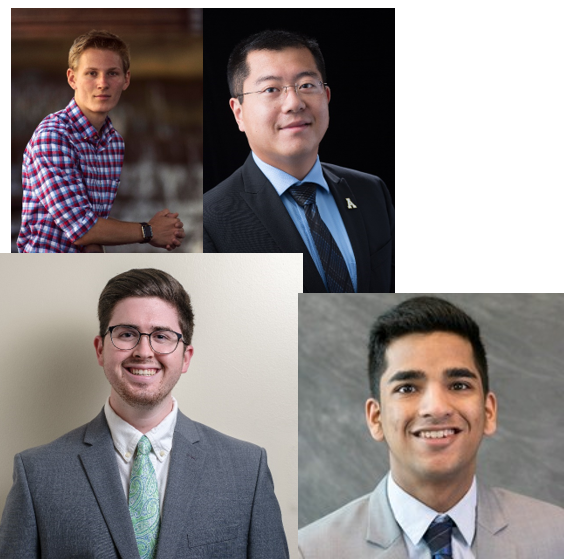Walker College of Business students will be included as part of Appalachian State University's Office of Student Research's 2021 celebration of student research and creative endeavors.
The all-virtual event is available online April 15-22. Visit the site to see all of the 126 projects.
Marketing major Will O'Malley's research is entitled Cryptocurrency and Coronavirus: How a Global Pandemic Affects Decentralized Currency. His faculty mentor is Assistant Professor of Computer Information Systems, Dr. Jason Xiong, and his co-authors are CIS major, Caleb Wright and MSADA candidate and CIS Graduate Assistant, Manas Desai.
O'Malley's Research Abstract
Cryptocurrency is a digital, intangible currency that utilizes blockchain technology as an operating system. Blockchain technology acts as an immutable ledger therefore making cryptocurrency significantly more secure than traditional methods. Since the inception of cryptocurrency, there has been a slow growth rate of adoption. However, this has changed within the past two years. In November of 2019, a SARS-CoV-2 outbreak began to spread around the world. During that time, there was a significant increase in both the value and adoption of cryptocurrencies such as Bitcoin and Ethereum. In contrast to this financial phenomenon, most of the global economy went into a freefall due to the pandemic. Leaving a distrust in central, national currencies, a surge of people turned to cryptocurrency to keep their money safe during this unprecedented time. This alongside other factors led to a higher adoption rate of this intangible technology than ever recorded. Through survey questions utilizing Igbaria’s Model and Cognitive Dissonance Theory, the behavior that caused increased adoption and the Coronavirus pandemic has a causal relationship. Human behavior has been impacted by the Coronavirus pandemic and has caused thousands to reconsider how their money is stored. The purpose of this research it to connect these two concepts. In order to understand how to further push mass adoption of cryptocurrency, it is crucial to understand what caused this rapid increase in value during COVID-19.
Economics major Connor Lubsen's research is entitled Individualistic and Collectivistic Mindsets Impact on Cooperative Behavior in Society.
Lubsen's faculty mentor is Associate Professor of Economics, Dr. Brock Stoddard.
Lubsen's Research Abstract
This research program will study the different effects that individualistic and collectivistic mentalities have in economic games. Individualists see events between people as independent; where the collectivists see events between people as ultimately connected. This research will aim to observe those differences in how subjects interact with one another in an experiment. Participants will first complete a triad task that scores them on an individualist/collectivist scale. Next, participants will play a prisoner’s dilemma game. In the game, matched participants choose between cooperative and deviant actions. Participants’ payoffs vary depending on their own and their matched partners’ actions. Participants will play this game for multiple interactions, and for multiple rounds within each interaction. Participants will be matched with a participant for each dilemma game interaction. To further highlight differences between individualists and collectivists, in some experimental sessions, subjects will participate in a group identity task prior to the prisoner’s dilemma interactions. The group identity task will split participants in a session into two separate teams. Participants knowing if their partners are from the in-group or the out-group will create a bias. When matched with an in-group partner, we 26 predict cooperation rates will be higher for collectivists. However, when matched with an in-group partner, we predict cooperation rates will be higher for individualists.
Economics student Carlie Smith's research is entitled Framing & Inequality in Public Goods Games.
Smith's faculty mentor is also Dr. Brock Stoddard.
Smith's Research Abstract
We study framing effects in repeated social dilemmas by comparing payoff equivalent Give and Take framed public goods games under varying endowment and productivity inequality. In the Give frame, group members contribute endowed tokens to a public good. In the Take frame, group members can take from an existing public good up to a predetermined limit. Within games that reflect endowment inequality, four group members will be divided, half each receiving 15 convertible tokens (or a maximum take of 15 tokens) and the other half each receiving 5 convertible tokens (or a maximum take of 5 tokens). Within games that reflect productivity inequality, group members will have different capabilities for producing a public good. Token contributions to (or tokens left in) the public good by half of the group members will have a higher production value for the group than the production value of tokens from the other half of the group members. We will be analyzing decision making across 10 decision rounds, to assess whether framing and inequality affect subjects’ decisions. We will utilize statistical hypothesis tests and regression analysis to perform our behavioral analysis.
Supply Chain Management major Sonoma Dixon's research is entitled Personality and its Affect on Consumer Satisfaction and Loyalty in the United States Airline Industry.
Dixon's faculty mentor is associate professor of marketing and supply chain management , Dr. Steven Leon, and her co-author is assistant professor of computer information systems, Dr. Hoon Choi.
Dixon's Research Abstract
Service quality has been shown to positively influence customer satisfaction and customer satisfaction has been shown to positively influence loyalty. Even though the airline industry invests in customer experience initiatives, United States airlines rank low in satisfaction surveys. Several studies have identified that personality influences consumer and job satisfaction. Thus, the objective of this study is to determine if personality has a significant impact on consumer satisfaction and loyalty in the airline industry. Linear regression was employed to determine such impact. Data were collected through an online survey in 2018 through Amazon Mechanical Turk to ascertain personality, satisfaction, service quality, loyalty, and trust variables. The survey resulted in 624 usable responses. It is expected that the Big 5 Personality types will have a significant impact on both consumer satisfaction and behavioral intention loyalty. The results show that, in part, personality does influence satisfaction, though not necessarily loyalty. This research can be used to increase the understanding of consumer satisfaction in the United States airline industry. Moreover, this research delves into a new impact on the consumer sector of the United States, laying the groundwork for potential future studies about satisfaction and personality.
Full access the meeting content
If you have not attended a conference with ForagerOne you will need to register on their site using your App State email address to enter into the conference. After creating an account, you will receive a verification email from ForagerOne. From there, click through and search for Appalachian State. Registrants will be able to see all poster and oral presentations via the presentations link. Learn more.
About student research in the Walker College of Business
Given the speed by which the world changes, students must develop the ability to constantly adapt. While the traditional classroom setting plays an important role, it must be complemented with a diversity of other approaches that more fully develop students' adaptive capabilities and enhance readiness for an ever-changing world. To reach this goal, the Walker College supports project-based applied research and learning opportunities through partnerships with external entities, encourages research collaboration across departments, campus and other institutions, and promotes student involvement in faculty-led research. Learn more at business.appstate.edu/students/research.

